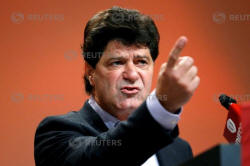How Trump split Mexico and Canada in NAFTA talks
 Send a link to a friend
Send a link to a friend
 [September 25, 2018]
By Dave Graham [September 25, 2018]
By Dave Graham
MEXICO CITY (Reuters) - A day after winning
the Mexican presidential election, Andres Manuel Lopez Obrador took a
congratulatory call from U.S. President Donald Trump. But Trump had
something more important on his mind: Would Mexico's new president
consider a bilateral trade deal?
Lopez Obrador responded he would be "open to the possibility” in the
absence of a trilateral agreement that also included Canada, said Hector
Vasconcelos, a foreign policy advisor to Lopez Obrador’s campaign who
listened to the call on July 2.
Lopez Obrador's answer marked a pivotal moment after a contentious year
of negotiations between the United States, Canada and Mexico to rework
the North American Free Trade Agreement (NAFTA), the framework for more
than a trillion dollars in annual trade between the three.
Until then, Mexico and Canada had worked together to counter the
economic and political clout of the United States as Trump demanded more
favorable terms for the world's largest economy and repeatedly called
NAFTA a “disaster” for U.S. workers. But the election victory for Lopez
Obrador, a leftist opposition candidate, gave Trump an opportunity to
divide Mexico and Canada and cut a deal the way he wanted - one-on-one.

"I think I'm doing better with (Lopez Obrador) than the capitalist,"
Trump told his supporters at a West Virginia rally last month, referring
to Mexico’s outgoing president, Enrique Pena Nieto.
The shift in Mexico's position came as the rival incoming and outgoing
administrations realized that a deal with the United States before the
presidential changeover would suit them both, according to interviews
with more than a dozen people familiar with the talks.
Lopez Obrador's new government was eager to sidestep conflict with Trump
and focus on domestic issues. The president-elect - who has little
enthusiasm for foreign relations - wanted to avoid the headache of
navigating a complex trade negotiation left over from a previous
presidency, said three senior officials with the incoming
administration.
"The best foreign policy is domestic policy," Lopez Obrador has said
several times publicly.
Pena Nieto's outgoing team wanted to rescue a tangible achievement from
two years of bruising negotiations, which overshadowed the last third of
his presidency, hampered investment and roiled Mexico’s currency,
according to the sources familiar with the talks. While Mexican law
doesn’t allow presidents to seek re-election, the candidate Pena Nieto
backed lost by a wide margin.
Throughout most of the talks, Pena Nieto’s administration had reasoned
that, together, Canada and Mexico had more leverage in negotiations that
were stacked in Trump's favor. Both economies depend heavily on U.S.
customers, with Mexico sending about 80 percent of exports to the United
States and Canada sending about 75 percent. Together, Mexico and Canada
account for slightly more than a third of U.S. exports.
But on Aug. 27, less than two months after Trump’s call to Lopez Obrador,
negotiators for the United States and Mexico struck a deal.
“Mexico had to look out for Mexico,” said Moises Kalach, head of the
international negotiating arm of the CCE business lobby, which
represented Mexico's private sector at the NAFTA talks.
Mexican officials point out that Canada had previously signaled that it
might take the same path. Early last year, the Canadian ambassador to
Washington, David MacNaughton, said publicly that Canada would act
trilaterally or bilaterally depending on its interests.
Canada’s office of Foreign Minister Chrystia Freeland declined to
comment on the U.S.-Mexico deal or its impact on Canada’s ongoing talks
with the United States. The White House did not comment in response to
Reuters questions.
LEFT OUT
The U.S.-Mexico pact has prompted many of Canada’s business and
political leaders to ramp up pressure on Prime Minister Justin Trudeau
to cut his own deal with the United States.
Mexico weakened Canada's negotiating leverage when it conceded on some
issues important to Ottawa, including a mechanism to resolve disputes
between NAFTA members known as Chapter 19, which Canadian officials say
offers protection from unfair trade practices. Canada used the process
to defend its lumber exports in the face of U.S. charges that the timber
is unfairly subsidized.
Canada is also resisting U.S. demands to open the protected dairy
industry to U.S. competitors.
[to top of second column] |

Unifor President Jerry Dias speaks during the Unifor convention in
Ottawa, Ontario, Canada, August 24, 2016. REUTERS/Chris Wattie/File
Photo

Canadian officials believe Mexico gave up too much in the deal, said an
influential private sector union leader with close ties to Canada’s negotiators.
“There’s a general feeling that the Mexicans capitulated in some key areas,”
Unifor president Jerry Dias said in a phone interview.
DEADLINE FOR A DEAL
Pena Nieto needed an agreement by the end of August. Any later would have meant
that he won’t be able to sign it before leaving office on Nov. 30 because it
could take 90 days for the U.S. Congress to review and approve the deal.
Trump, a Republican, still faces opposition from some members of his party in
Congress who favor a trilateral agreement, along with the risk that Republicans
could suffer defeats in the upcoming mid-term elections on November 6 and lose
their majority in the U.S. House or Senate.
Trump’s deal with Mexico could help his party in the elections because many
states that helped elect the president in 2016, particularly in agricultural
regions, would have been hurt by a breakdown in trade with Mexico, said Kalach
of the CCE business lobby.
Personal connections also smoothed the path to a deal. Among those tasked with
leading the Mexican negotiation was Luis Videgaray, foreign minister for the
outgoing administration, who forged a relationship with Trump's son-in-law and
adviser Jared Kushner. The two men had met through Wall Street connections
before Trump’s inauguration in 2017.
The arrival of Lopez Obrador's chief negotiator, Jesus Seade, also accelerated
the process, officials familiar with the talks said. Videgaray told Mexican
television it was Seade who broke the deadlock over a U.S. demand for a
so-called "sunset clause" that could kill NAFTA if it was not reworked in five
years.
Videgaray's connection to Kushner, a regular participant in the talks, proved
vital in containing tensions and sustaining negotiations, said Gustavo de Hoyos,
head of Mexican employers' confederation COPARMEX.
"Videgaray has had the most access to the White House of any Mexican foreign
minister in years," he said.

TRADING CONCESSIONS
With a mutually agreeable end-of-August deadline in place, both sides came away
from negotiations with some victories.
Mexico's negotiators convinced Washington to drop a demand for curbs on seasonal
food imports and to retain an exemption granted under NAFTA from industrial
tariffs imposed by the United States under World Trade Organization (WTO) rules.
The United States will likely retain more auto-industry jobs after Mexico agreed
to impose minimum salary requirements on the sector – at least $16 an hour for
between 40 and 45 percent of workers, five times what most earn now.
Pena Nieto had resisted that request as a protectionist intrusion into Mexican
labor issues. Lopez Obrador was more supportive, said Dias of the Canadian Union
Unifor.
Lopez Obrador wants to improve wages and persuade Trump to help foster economic
development in Mexico as a way to curb Mexican immigration to the United States.
For Mexico, pressing on without Canada would prove one of the most important
concessions in opening the path to a deal.
"We had to decide whether we wanted to move forward with a deal which protected
our country's interests, or put those very interests at risk by waiting for
Canada,” said Kalach of the CCE. “I think Canada would have acted similarly.”
(Reporting by Dave Graham; Additional reporting by David Ljunggren in Ottawa,
Roberta Rampton in Washington, Frank Jack Daniel, Ana Isabel Martinez, Anthony
Esposito and Sharay Angulo in Mexico City; Editing by Simon Webb and Brian
Thevenot)
[© 2018 Thomson Reuters. All rights
reserved.] Copyright 2018 Reuters. All rights reserved. This material may not be published,
broadcast, rewritten or redistributed.
Thompson Reuters is solely responsible for this content. |